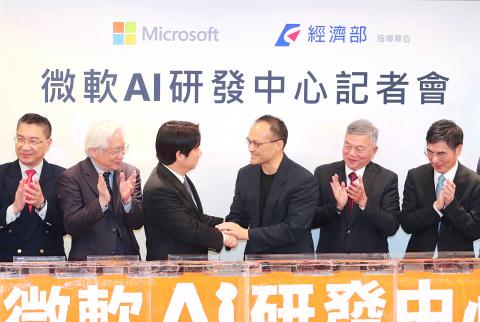Microsoft Corp yesterday announced the launch of an artificial intelligence (AI) research and development (R&D) center in Taiwan, and the company’s aim of hiring and training more than 200 researchers and developers in the next five years to boost the nation’s AI industry.
The Microsoft AI R&D Center is the first foreign-business-backed center to focus on AI technology in the nation.
“Microsoft would like to contribute to Taiwan’s industry upgrade. We will do our best to help Taiwan acquire a strategic position in the global AI landscape,” Microsoft Taiwan general manager Ken Sun (孫基康) told a news conference at the US company’s office in Taipei.

Photo: CNA
Sun said the reason Microsoft chose to build the center in Taiwan is because the nation’s education system has cultivated a lot of talent in mathematics, engineering and the sciences.
Taiwan’s leading position and capability in the global manufacturing industry, as well as the government’s support, prompted Microsoft to launch the project here, he said.
“The government really appreciates Microsoft’s help in developing Taiwan’s AI industry. The government will give full support to Microsoft’s project here,” Premier William Lai (賴清德) said at the news conference.
Sun said the company is to invest NT$1 billion (US$33.78 million) and foster 100 people in the R&D team in the first two years.
The center’s capacity would continue to grow and Microsoft aims to recruit 200 people within five years, he added.
Microsoft Taiwan marketing and operating head Jason Tsao (趙質忠) said the company is to start a campus recruitment tour between March and April.
Tsao said the R&D center is also to develop industry-specific applications, focusing mainly on the AI-augmented keyboard application SwiftKey, Audience Intent Recognition and sharing some of Microsoft’s AI technology with Taiwanese firms.
Tsao said by collaborating with firms in the manufacturing sector, Microsoft would be able to understand the application needs of those companies, and help them to transform and restructure with AI.
Microsoft said the R&D center would complement the Microsoft IoT Innovation Center to accelerate innovation in Taiwanese industries.
The Microsoft AI R&D Center represents the firm’s latest efforts regarding AI projects in Taiwan.
In September last year it launched the “AI Talent Cultivation Project” with Taipei Medical University. It also inked an “AI Strategic Alliance” letter of intent with the National Applied Research Laboratories last month.

Tropical Storm Gaemi strengthened into a typhoon at 2pm yesterday, and could make landfall in Yilan County tomorrow, the Central Weather Administration (CWA) said yesterday. The agency was scheduled to issue a sea warning at 11:30pm yesterday, and could issue a land warning later today. Gaemi was moving north-northwest at 4kph, carrying maximum sustained winds near its center of up to 118.8kph and gusts of 154.8kph. The circumference is forecast to reach eastern Taiwan tomorrow morning, with the center making landfall in Yilan County later that night before departing from the north coast, CWA weather forecaster Kuan Shin-ping (官欣平) said yesterday. Uncertainty remains and

SEA WARNING LIKELY: The storm, named Gaemi, could become a moderate typhoon on Wednesday or Thursday, with the Taipei City Government preparing for flooding A tropical depression east of the Philippines developed into a tropical storm named Gaemi at 2pm yesterday, and was moving toward eastern Taiwan, the Central Weather Administration (CWA) said. Gaemi could begin to affect Taiwan proper on Tuesday, lasting until Friday, and could develop into a moderate typhoon on Wednesday or Thursday, it said. A sea warning for Gaemi could be issued as early as Tuesday morning, it added. Gaemi, the third tropical storm in the Pacific Ocean this typhoon season, is projected to begin moving northwest today, and be closest to Taiwan on Wednesday or Thursday, the agency said. Today, there would likely

DISRUPTIONS: The high-speed rail is to operate as normal, while several airlines either canceled flights or announced early departures or late arrivals Schools and offices in 15 cities and counties are to be closed today due to Typhoon Gaemi, local governments announced last night. The 15 are: Taipei, New Taipei City, Taoyuan, Tainan, Keelung, Hsinchu and Kaohsiung, as well as Yilan, Hualien, Hsinchu, Miaoli, Chiayi, Pingtung, Penghu and Lienchiang counties. People should brace for torrential rainfall brought by the storm, with its center forecast to make landfall on the east coast between tonight and tomorrow morning, the Central Weather Administration (CWA) said. The agency issued a sea warning for the typhoon at 11:30pm on Monday, followed by a land warning at 11:30am yesterday. As of

CASUALTY: A 70-year-old woman was killed by a falling tree in Kaohsiung as the premier warned all government agencies to remain on high alert for the next 24 hours Schools and offices nationwide are to be closed for a second day today as Typhoon Gaemi crosses over the nation, bringing torrential rain and whipping winds. Gaemi was forecast to make landfall late last night. From Tuesday night, its outer band brought substantial rainfall and strong winds to the nation. As of 6:15pm last night, the typhoon’s center was 20km southeast of Hualien County, Central Weather Administration (CWA) data showed. It was moving at 19kph and had a radius of 250km. As of 3pm yesterday, one woman had died, while 58 people were injured, the Central Emergency Operation Center said. The 70-year-old